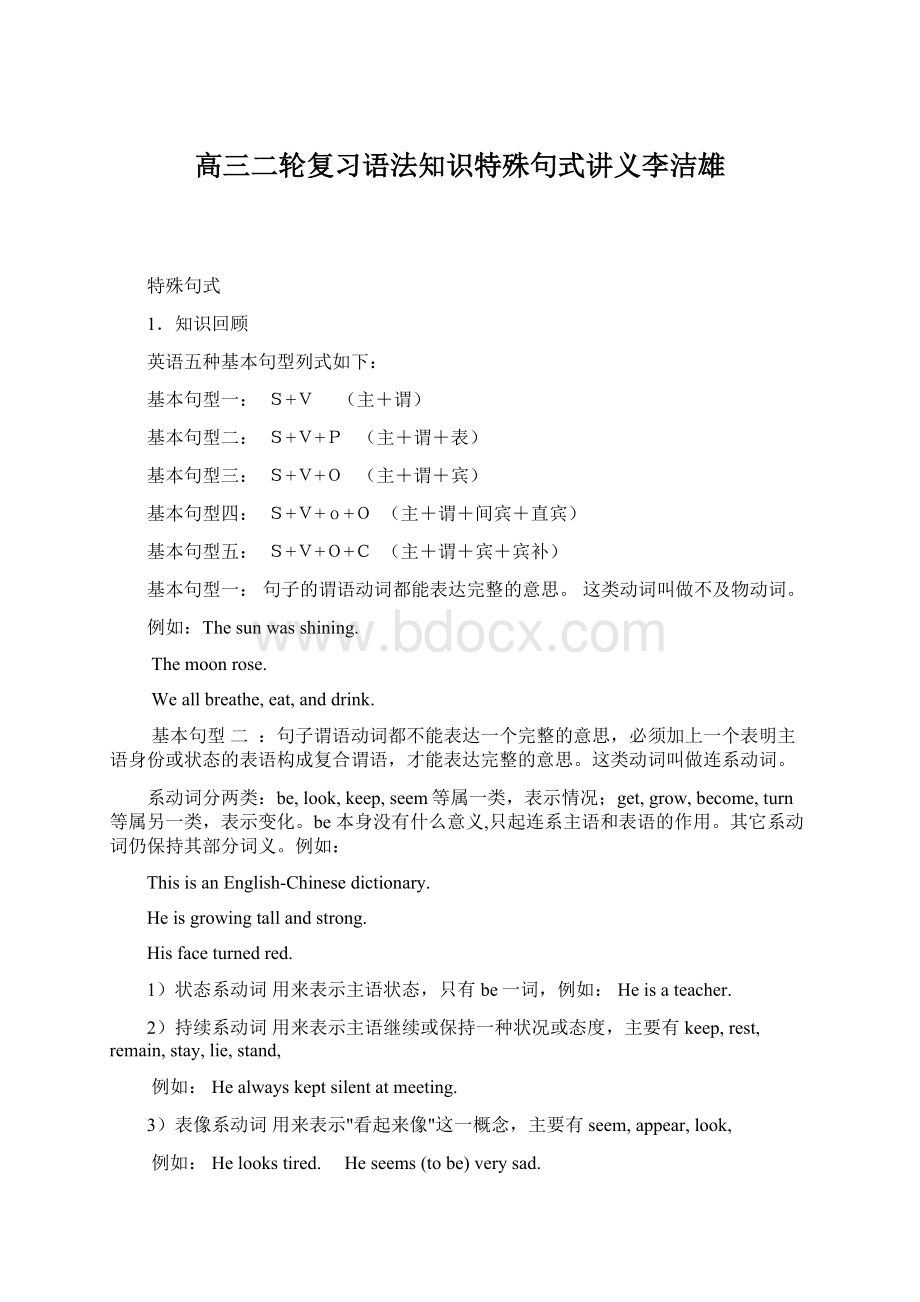高三二轮复习语法知识特殊句式讲义李洁雄Word文件下载.docx
《高三二轮复习语法知识特殊句式讲义李洁雄Word文件下载.docx》由会员分享,可在线阅读,更多相关《高三二轮复习语法知识特殊句式讲义李洁雄Word文件下载.docx(19页珍藏版)》请在冰豆网上搜索。

句子谓语动词都不能表达一个完整的意思,必须加上一个表明主语身份或状态的表语构成复合谓语,才能表达完整的意思。
这类动词叫做连系动词。
系动词分两类:
be,look,keep,seem等属一类,表示情况;
get,grow,become,turn等属另一类,表示变化。
be本身没有什么意义,只起连系主语和表语的作用。
其它系动词仍保持其部分词义。
ThisisanEnglish-Chinesedictionary.
Heisgrowingtallandstrong.
Hisfaceturnedred.
1)状态系动词用来表示主语状态,只有be一词,例如:
Heisateacher.
2)持续系动词用来表示主语继续或保持一种状况或态度,主要有keep,rest,remain,stay,lie,stand,
例如:
Healwayskeptsilentatmeeting.
3)表像系动词用来表示"
看起来像"
这一概念,主要有seem,appear,look,
Helookstired. Heseems(tobe)verysad.
4)感官系动词感官系动词主要有feel,smell,sound,taste,
Thiskindofclothfeelsverysoft. Thisflowersmellsverysweet.
5)变化系动词 这些系动词表示主语变成什么样,变化系动词主要有become,grow,turn,fall,get,go,come,run.
Hebecamemadafterthat. Shegrewrichwithinashorttime.
6)终止系动词表示主语已终止动作,主要有prove,turnout,表达"
证实"
,"
变成"
之意,
Therumorprovedfalse. Thesearchproveddifficult.
Hisplanturnedoutasuccess.
基本句型三:
谓语动词都具有实义,都是主语产生的动作,但不能表达完整的意思,必须跟有一个宾语,即动作的承受者,才能使意思完整。
这类动词叫做及物动词。
He
enjoysreading.
He
admitsthathewasmistaken.
基本句型四:
谓语动词必须跟有两个宾语才能表达完整的意思。
这两个宾语一个是动作的直接承受者,另一个是动作的间接承受者。
Ishowedhimmypictures.
Itoldhimthatthebuswaslate.
动词虽然是及物动词,但是只跟一个宾语还不能表达完整的意思,必须加上一个补充成分来补足宾语,才能使意思完整。
Theypaintedthedoorgreen.
Heaskedmetocomebacksoon.
Isawthemgettingonthebus.
2.新知传授
(一)教学目标:
①知识目标:
通过讲解特殊句式,让学生掌握特殊句式的用法;
②技能目标:
通过针对性练习,提高学生的审题思维和解题能力;
③情感目标:
激发学生学习新知识的兴趣,热爱英语,热爱学习;
(二)重难点:
①授课重点:
therebe句型、强调句式、倒装
②授课难点:
全部倒装与部分倒装的情况
(3)知识梳理:
特殊句式包含:
1.therebe句型
2.倒装句
3.强调句
4.省略句
5.插入语
6.分隔句式
1.Therebe句型
1.1Therebe句型的意义:
表示“某处有某物”。
e.g.:
Thereisasmallvillageatthefootofthemountain.
1.2Therebe句型的时态:
thereis/are;
therewas/were;
therehave/hasbeen;
therewillbe/thereisgoingtobe;
e.g.:
Therewasameetinginourschoolyesterday.
Therehavebeenmanygreatchangesinourcountrysincethen.
Therewillbeawonderfulconcertthisweekend.
1.3Therebe的变式
therebe结构中的be动词之前有时还可加上seemto,appearto,happento,usedto,情态动词等用来描写事物;
还可以用stand,live,remain,exist等替换,用来表示“静止、存在”等概念。
Thereseemedtobenoonewhoreallyunderstoodme.
Therelivesafamilyoffiveupstairs.
1.4:
Therebe+名词+非谓语动词
Therebe结构的非谓语形式有两种基本结构:
theretobe和therebeing
Therebeingnotenoughtimeleft,wehavetobehurry.
Iexpecttheretobenoargumentaboutthis.
1.5:
注意:
1.5.1Therebe不可与have连用
1.5.2Therebe后的谓语动词遵循就近原则
1.5.3Therebe句型的固定搭配
Thereisnouse/sense/point+v-ing
e.g.:
Thereisnopointincryingoverspilledmilk.
Thereisnoneed+todo
Thereisnoneedtowaitforhimanylonger
Thereisnodoubt+that从句
ThereisnodoubtthatmyEnglishisgood.
倒装语序,分全部倒装和部分倒装。
全部倒装是把全部谓语放在主语之前,部分倒装是把谓语的一部分(如助动词、情态动词、be动词)放在主语之前。
2.1全部倒装
2.1.1以in,out,up,down,away,off,back,there,here,now,then等副词在句首作状语,谓语动词是come,go,rush,run等不及物动词时,句子要全部倒装。
(主语必须是名词)
Outrushedthechildren.
Herecomesyourhusband.
Nowcomesyourturn.
2.1.2表示地点的介词词组谓语句首,谓语动词是be,stand,sit,lie等的句子里,用完全倒装。
Infrontofthelecturehallsitsaprofessor.
Onthegroundlayasickgoat.
2.1.3such置于句首时。
SuchwasEinstein,asimplebutgreatscientist.
2.1.4分词/形容词+地点状语+be+主语
e.g.:
Seatedinthefrontaretheleadersoftheschool.
Sittinginthefrontaretheleadersoftheschool.
2.1.5在there,here,引导的句子中,谓语是be,exist,appear,come,happen,lie,live,occur,remain,seem,stand等不及物动词时。
Therestandsatempleonthetopofthemountain.
Hereisaseatforyou.
2.1.6.直接引语中间或后面,表示某人说这意思的插入语(特别是谓语较短时)。
“Theymustbeinthefieldsnow,”thoughtXiaoLin.
“Help!
Help!
”criedthelittlegirl.
2.2部分倒装
2.2.1only修饰副词、介词短语或状语从句,且放在句首时。
Onlybyworkinghardcanwesucceed.
Onlywhenhereturneddidwefindoutthetruth.
2.2.2含有否定意义的副词、连接词放在句首引起的部分倒装
表示否定的副词never,nor,neither,
表示半否定意义的副词hardly,few,seldom,little,
含有no和not的词组bynomeans(决不),innotime(很快),
atnotime(在任何时候都不),(在任何情况下都不)
notuntil,notonly...butalso,
nosooner...than=hardly...when/scarcely...when
NeverbeforehaveIseensuchamovingfilm.
HardlydoIthinkitpossibletofinishthejobbeforedark.
Notuntil4:
00inthemorningcanwefallasleep.
Notonlywillhelpbegiventopeopletofindjobs,butalsomedicaltreatmentwillbeprovidedforpeoplewhoneedit.
2.2.3“so(nor,neither)+助动词+主语”
“so+助动词/情态动词/系动词+主语”
表示前面叙述的情况也适合于另一个人或物,意为“也,同样,也如此”。
“neither/nor+助动词/情态动词/系动词+主语”
表示前面叙述的否定情况也适合于另一个人或物。
Isawthefilmlastweek.Sodidshe.
Ihaveneverbeenabroad.Neitherhashe.
注意:
表示前面的多种情况也适合于另一人或物,或者既有肯定又有否定情况或涉及到不同类型的动词时可用:
Itisthesamewithsth./sb.或Soitiswithsth./sb.句型。
ShedoeswellinEnglish,butispoorinmaths.SoitiswithLucy.
她英语学得好,但数学学的差,露茜也是如此。
2.2.4so/such...that(如此...以至于)句型中,若so/such...that提至句首,主句需部分倒装。
SoclearlydoeshespeakEnglishthathecanalwaysmakehimselfunderstood.
2.2.5省略if的虚拟条件句以had/were/should开头引起的部分倒装
Wereshemyfriend,Iwouldaskherforhelp.
Shouldhecometomorrow,Iwouldtellyou.
2.3形式倒装
2.3.1感叹句:
对中心词是名词感叹时,用what引导;
对形容词或副词感叹时,用how引导。
Whataninterestingtalktheyhad!
Howinterestingtheirtalkis!
2.3.2themore...,themore...句型(more代表形容词或副词的比较级)
ThemoreyoulistentoEnglish,theeasieritbecomes.
2.3.3whatever.../however...引导的让步状语从句
Howeverdifficulttheproblemmaybe,wemustworkitoutthisevening.
2.3.4由as、though引导让步状语从句要用部分倒装或前置
Strangeas/thoughitseems,itistrue.
Childasheis,hecancarrythebigbox.
2.3.5某些表示祝愿句子也用倒状语序.
e.g.Mayyousucceed.
LonglivetheCommunistPartyofChina!
3.强调句
强调句是为了对一定语境下的部分内容进行突出而采用的一种修辞手段。
强调的方式主要有以下三种:
3.1使用强调句型进行强调
3.1.1陈述句的强调句型:
Itis/was+被强调部分(主、宾、状)+that/who(当强调主语且主语指人)+其它部分
强调句的否定句形式为:
Itis/wasnot+被强调部分+that/who...
ItwasIthat/whodidn’trealizedallmymistakesuntilyoutoldmeyesterday.
3.1.2一般疑问句的强调句型:
同上,只是把is/was提到it前面。
e.g.:
WasitSallythatphonedjustnow?
3.1.3特殊疑问句的强调句型:
被强调部分(通常是疑问代词或疑问副词)+is/was+it+that/who+其它部分?
Whenandwherewasitthatyouwereborn?
3.1.4注意:
构成强调句的it本身没有词义;
强调句中的连接词一般只用that,who,即使在强调时间状语和地点状语时也如此,that,who不可省略;
强调句中的时态只用两种,一般现在时和一般过去时。
原句谓语动词是一般过去时、过去完成时和过去进行时,用Itwas…,其余的时态用Itis…。
3.1.5not…until…句型的强调句
句型为:
Itis/wasnotuntil+被强调部分+that+其它部分
普通句:
Hedidn’tgotobeduntil/tillhiswifecameback.
强调句:
Itwasnotuntilhiswifecamebackthathewenttobed.
此句型只用until,不用till。
但如果不是强调句型,till,until可通用;
因为句型中Itis/wasnot…已经是否定句了,that后面的从句要用肯定句,切勿再用否定句了。
3.2利用词语进行强调
3.2.1用thevery、theonly等强调名词
Youaretheverypersonforthisjob.
3.2.2用right/just强调副词性词组
Iputthatbookrighthereamomentago.
3.2.3用onearth、intheworld、thehell、置于疑问词后,表示“到底,究竟”以加强语气。
Whatonearthisthematterthere?
3.2.4用ever系列强调
Thisisthebestever!
Whateveryoudo,whereveryougo,Iwillwaitingforyou.
3.2.5用助动词do/does或did强调谓语,Itis/was…that…结构不能强调谓语。
e.g.:
Hedidwritetoyoulastweek.
Dobecarefulwhenyoucrossthestreet.
此种强调只用do/does和did,没有别的形式;
后面的谓语动词用原形。
3.2.6atall“完全、根本”时,多用于否定句、条件句;
肯定句或疑问句时,意为“真的、确实”。
Ifitwerenotforthesun,wecouldnotliveatall.
Doyoufeelillatall?
3.3What...is/was...句式进行强调
WhatJohndidlastnightwastopreparealongreport.
省略主要在于避免重复,同时又不影响句子意义的表达。
4.1功能词的省略
4.1.1冠词的省略
两个并列的名词前面,第二个可以省略
如果省去冠词会误会为一个人则不省略。
Isthebabyaboyor(a)girl?
Theyarethegardenerandthegatekeeper.
在某些独立主格结构中,
Ourteachercamein,bookinhand.(withabookinhishand)
4.1.2名词所有格后名词的省略
TheseareJohn’sbooksandthoseareMary’s(books).
Atthedoctor’s(office)
4.1.3介词的省略
havedifficulty/problem/trouble+(in)+v-ing
spend(in)+v-ing
thereisnouse/sense/point+(in)+v-ing
stop/prevent(from)+v-ing
bebusy+(in)+v-ing
endup+(by)+v-ing
taketurns(at)+v-ing
haveagood/great/fun/hard/time+(in)+v-ing
4.1.4连词的省略:
not(only)…but(also);
whether...(ornot);
so(that)...;
now(that);
关系代词代替先行词在定语从句中作宾语且其前没有介词或先行词为way或time等时,常省略关系代词。
Idon’tliketheway(that)hetalkstohisparents.
4.1.5动词不定式的省略
Theymaygoiftheywishto(go).
Hedidn’tcome,thoughwehadinvitedhimto(come).
4.2.句子成分的省略
4.2.1可省略主语和谓语
Awordaboutyourcomposition.(省略了I’llsay...)
Thoughtired,hewasnotdisheartened.(省略了hewas...)
4.2.2可省去从句
Youhavedonebetterthistime.省去从句thanyoudidbefore)
4.2.3可用不定式to,省去前面提到的谓语动词。
Jackdidn’tpassthedrivingtest,buthestillhopeto.(to后省去了pass)
杰克没有通过驾驶证考试,但他仍希望能通过。
4.2.4.可用so,not省略前面提到的事,表肯定与否定。
—Doyouthinkit’sgoingtorainovertheweekend?
你认为周末会下雨吗?
—Ibelievenot/Ibelieveso.我想不会/我想会的。
(即Idon’tbelieveit’sgoingtorain)
4.2.5.根据不同语境可省略不同成分。
onlyif,Ifonly,whatsoever,incase
IfonlyIknewhisphonenumber.
4.3句子的省略
4.3.1特殊疑问句的省略。
Whereto?
(=Whereareyougoingto?
)
Whatfor?
(例如:
Whatdoyoucomeherefor?
Whynotdoit?
(=Whydon’tyoudoit?
How/Whatabout(sb)doingsth.?
4.3.2比较从句中的省略
Iloveclassicmusicmorethan(Ilike) rockandroll.
Heisnolongersoshyas(hewas)before.
4.3.3在时间状语和条件状语从句中的省略
While(Iwas)onthestreet,Icameacrossafriendofmine.
If(youare)offeredhelp,neverforgettosay“Thankyou!
”
If(itis)possible,Iwouldliketogotheretomorrow.
4.3.4在其他状语从句中的省略
Iwon’tgothereunless(Iam)invited.
Thingshav